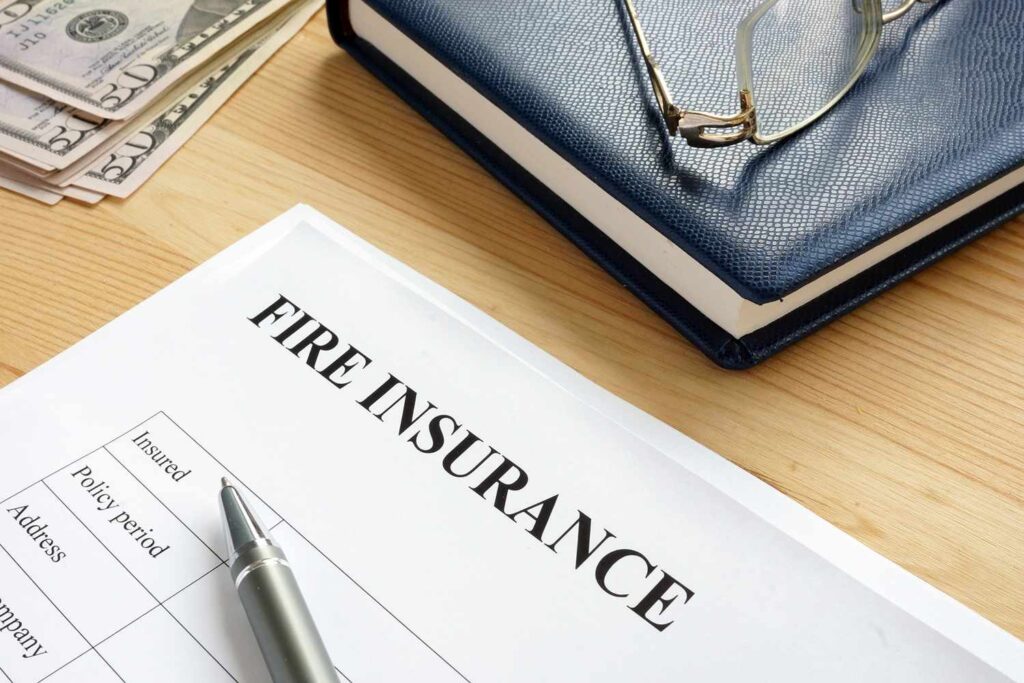Fire Insurance Guide: Fire insurance refers to the risk that a normal homeowners policy covers. If your home, an outbuilding, or your personal items are damaged or destroyed in a fire, your home insurance policy may cover the expenses of repairing or replacing damaged property, subject to the deductible and coverage limits of the policy.

How Does Fire Insurance Work?
Fire is a covered peril in most homeowners insurance policies, protecting you against property damage or loss due to a fire. Smoke is also a commonly covered peril. Commercial property insurance, condo insurance, and renters insurance can also provide coverage for fire.
Under a standard homeowners policy, you are covered for fire damage to the dwelling and any detached outbuildings on the premises, meaning the policy will cover the costs of repairs or rebuilding, as well as the costs to fix or replace home systems and appliances. Additionally, your personal property will be covered, and your loss of use coverage can apply to additional expenses incurred if the home is uninhabitable, such as if you need to stay in a hotel while repairs are made.
In terms of coverage limits for a homeowners policy, this number is either based on the home’s replacement cost value or actual cash value, depending on what you selected when you signed up for a policy. The former reimburses you based on today’s prices to repair, replace, or rebuild. The latter accounts for depreciation, so the payout would be for an item’s current estimated value.
If your cars are damaged during a fire, you would turn to the comprehensive coverage provided by your auto insurance policy.
After a fire, an eligible claim is paid out based on an appraisal of the damaged or lost items conducted by the policyholder and the insurance company’s adjustment team. This can also include items damaged by smoke and items damaged in the process of putting the fire out. Once the full amount of damage has been determined, the company sends a payment to the policyholder, minus their deductible.
Depending on the extent of the damage, it may pay out in installments as repairs, replacement, and rebuilding progresses – or it may pay the contractor, repair shop, or restoration company directly. If you finance your home or car, the lending company will also be listed on the claim payment.
What Doesn’t Fire Insurance Cover?
Although homeowners insurance policies typically cover losses from fire, they don’t usually cover fires that result from nuclear disaster, radiation, war, or arson. For example, if a powerline falls on your home and causes a fire, that will likely be covered. However, if you purposely start a fire to damage your home, this incident would be excluded from coverage.
If you live in an area prone to wildfires, such as California, some insurance companies may exclude or limit this type of coverage in their traditional homeowners policies. Be sure to read your policy carefully, and find out if you need additional coverage.
Who Needs Fire Insurance?
Having insurance for fire losses is not required by law, but if you have a mortgage on your home, your lender may require you to carry homeowners insurance, which includes fire as a covered peril. If you finance or lease your car, you will need to have comprehensive coverage on your auto insurance policy, and this coverage will apply to fire losses to the vehicle.
How Much Does Fire Insurance Cost?
The cost to insure against fire damage depends on how much coverage you need, where you live, and what your deductible is. The specific type of policy (e.g., homeowners or auto), the insurance company, and the number of claims you’ve filed previously will also affect the cost.
How To Buy Fire Insurance
If you feel your existing home insurance policy or other property insurance policy doesn’t adequately cover everything that could be impacted by a fire, you can reach out to your insurer and ask about your coverage limits. The company can guide you through the process of determining which items you want covered and how to assess their values. Then, simply choose a package that has enough coverage to replace your property or belongings.
If you’re worried about fire losses to your vehicle, contact your agent to add comprehensive coverage – or confirm that you already have it.
Why You Can Trust Us
At U.S. News & World Report, we rank the Best Hospitals, Best Colleges, and Best Cars to guide readers through some of life’s most complicated decisions. Our 360 Reviews team draws on this same unbiased approach to rate insurance companies and agencies. The team doesn’t keep samples, gifts, or loans of products or services we review. In addition, we maintain a separate business team that has no influence over our methodology or recommendations.